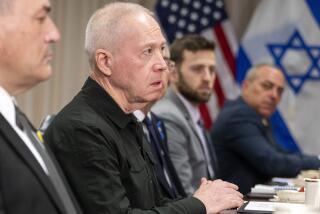Israel, Syria Agree to Talks Between Army Chiefs of Staff
- Share via
DAMASCUS, Syria — Israel and Syria inched ahead in their peace process Saturday by agreeing to send their army chiefs of staff to Washington for security talks June 27, a step that Secretary of State Warren Christopher said may at last accelerate the painfully slow negotiations.
Syrian President Hafez Assad accepted a U.S. proposal, already approved by Israel, to send each country’s highest-ranking military official to Washington to talk about ways to make sure that peace will not upset the military equilibrium that has prevailed since the end of the 1973 Middle East War.
“If we can make progress on the security issues, that will . . . make it easier to make progress on other issues as well,” Christopher told reporters after a three-hour meeting at Assad’s palace in the hills overlooking Damascus.
In a television interview later, Christopher said President Clinton would be willing to travel to the region if that would help nail down an agreement. A senior State Department official said there has been no discussion of such intervention, although Clinton is prepared to play a role “if it is required to complete a peace agreement.”
Once the possibility of presidential participation has been raised, even in an offhand way, it can take on a life of its own. Assad, who is concerned with his international standing, may insist that Clinton seal any peace deal to give it added weight. And it would be good politics going into next year’s election campaign for Clinton to be portrayed as a Middle East peacemaker.
Clinton telephoned both Assad and Israeli Prime Minister Yitzhak Rabin last week to press for progress in advance of Christopher’s mediation trip. The President last visited the Middle East in October.
On Saturday, Christopher said Assad indicated that he is ready to pick up the pace of negotiations, which have lagged compared to Israel’s talks with such other Arab adversaries as Jordan.
“President Assad was very clear in his mind that this is the time to move forward and make progress because of the electoral calendar in both Israel and the United States,” Christopher said, referring to concerns that elections next year will divert the attention of both Rabin’s government and U.S. mediators.
But so far there has been little tangible evidence of Assad’s concern for speed. Last month, Israel and Syria agreed to resume military-to-military talks but did not determine the rank of the participants. Israel wanted to use the chiefs of staff, while Syria preferred delegates of a slightly lower rank.
It took this visit by Christopher to hammer out a compromise: The talks will start with a meeting of about three days between the top officers, Syrian Lt. Gen. Hikmet Chehabi and Israeli Lt. Gen. Amnon Lipkin-Shahak, then recess for two weeks and resume with major generals representing each country.
A senior State Department official said the chiefs-of-staff meeting will give momentum to the talks but that it would be “not practical” to saddle the top military officers with a negotiation that could take months.
The official said the major generals will meet for about two weeks. No schedule has been adopted beyond that point.
The chiefs of staff held a single meeting last December that ended in acrimony. U.S. officials have been working since to put those talks back on track.
More to Read
Get the L.A. Times Politics newsletter
Deeply reported insights into legislation, politics and policy from Sacramento, Washington and beyond. In your inbox twice per week.
You may occasionally receive promotional content from the Los Angeles Times.










